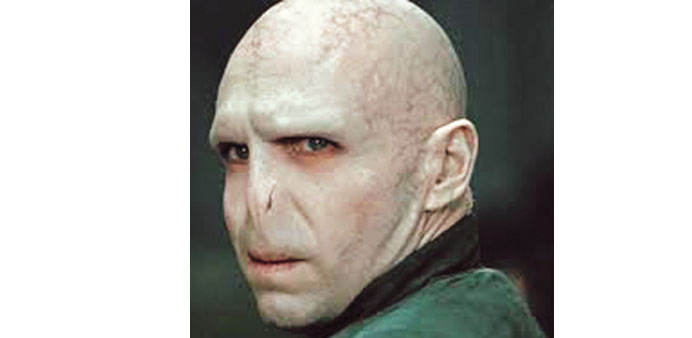REFERENCE POINT: Voldemort, as played by British actor Ralph Fiennes in the movies based on JK Rowling’s Harry Potter series.
The diplomatic bickering between Japan and China descended into name-calling in the British press yesterday, with ambassadorial claim and counter-claim invoking the fictional evil wizard of the Harry Potter series, Lord Voldemort.
In an opinion piece published in the Daily Telegraph newspaper, Tokyo’s envoy to London Keiichi Hayashi compared Beijing to the arch-villain of JK Rowling’s multi-million selling books and the resulting movie franchise.
“East Asia is now at a crossroads. There are two paths open to China,” he wrote. “One is to seek dialogue, and abide by the rule of law. The other is to play the role of Voldemort in the region by letting loose the evil of an arms race and escalation of tensions, although Japan will not escalate the situation from its side.”
“The answer seems obvious. Although China has so far refused to enable dialogue between our leaders, I sincerely hope that it will come forward, rather than keep invoking the ghost of ‘militarism’ of seven decades ago, which no longer exists,” Hayashi wrote.
Asia’s two biggest economies have long endured a difficult relationship characterised by disagreements on a wide range of issues, many of which are connected to bitter memories of violence in Asia by Japanese soldiers before and during World War II.
But ties have soured since Tokyo bought a set of disputed islands in the East China Sea in 2012, fuelling nationalism in both nations that has seen paramilitary ships and planes from both sides involved in regular stand-offs around the isles.
Hayashi’s letter was an apparent response to an earlier op-ed – also referencing the boy wizard’s nemesis – published in the Daily Telegraph on January 1 by Liu Xiaoming, Chinese ambassador to London.
Liu harshly criticised Japanese Prime Minister Shinzo Abe’s December 26 visit to Tokyo’s controversial Yasukuni war shrine, which honours war dead, including men convicted of serious war crimes in the wake of Japan’s 1945 World War II defeat.
The Shinto shrine is seen by China and other Asian nations as a symbol of Japan’s militarist past.
“If militarism is like the haunting Voldemort of Japan, the Yasukuni Shrine in Tokyo is a kind of horcrux, representing the darkest parts of that nation’s soul,” the Chinese envoy wrote.
In the Harry Potter series, a horcrux is a receptacle in which evil characters store fragments of their souls to enable them to achieve immortality.
Voldemort is only rarely referred to by his name in the books and films, with Hogwarts students and teachers frequently calling him simply “You Know Who”.
Hayashi said that Abe’s visit was “by no means to pay homage to war criminals or to praise militarism”.
“It is ironic that a country that has increased its own military spending by more than 10% a year for the past 20 years should call a neighbour ‘militarist’,” Hayashi wrote.
“Its attempt to change the status quo by force or coercion has raised concerns not only in Japan, but also among its neighbours throughout the East China Sea and the South China Sea,” he wrote in a reference to China’s vigorous claims to territories disputed by nations such as the Philippines and Vietnam.

